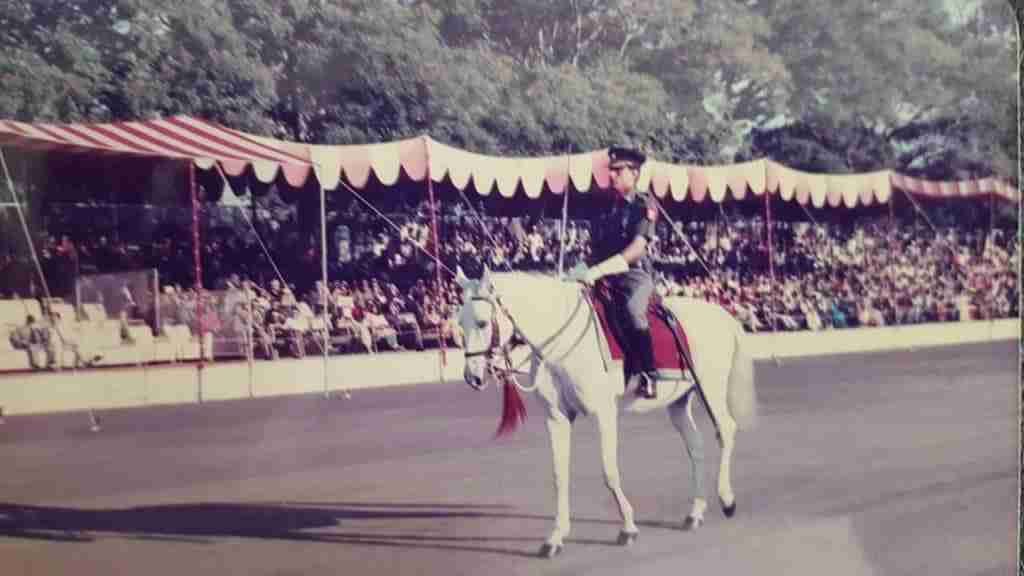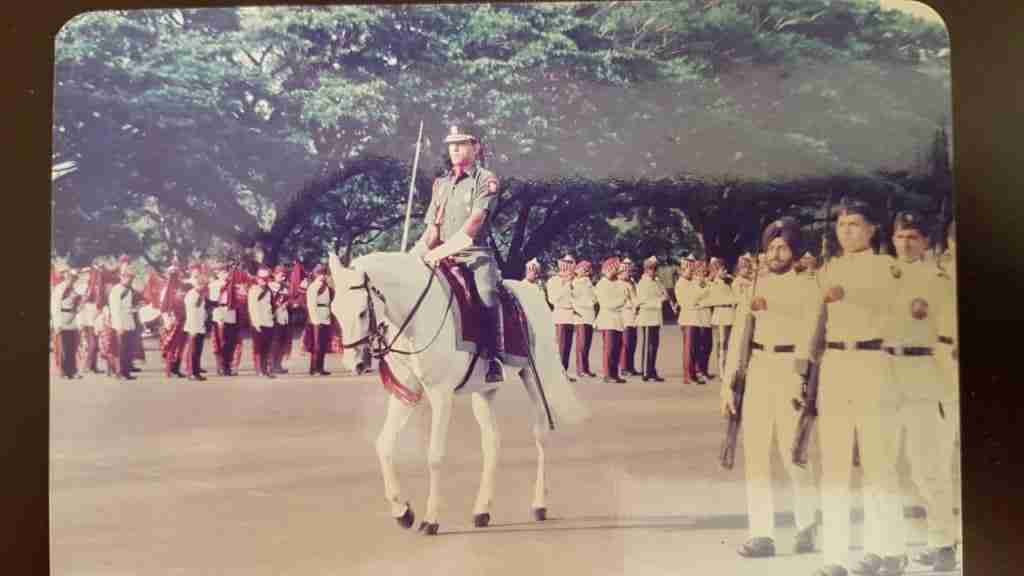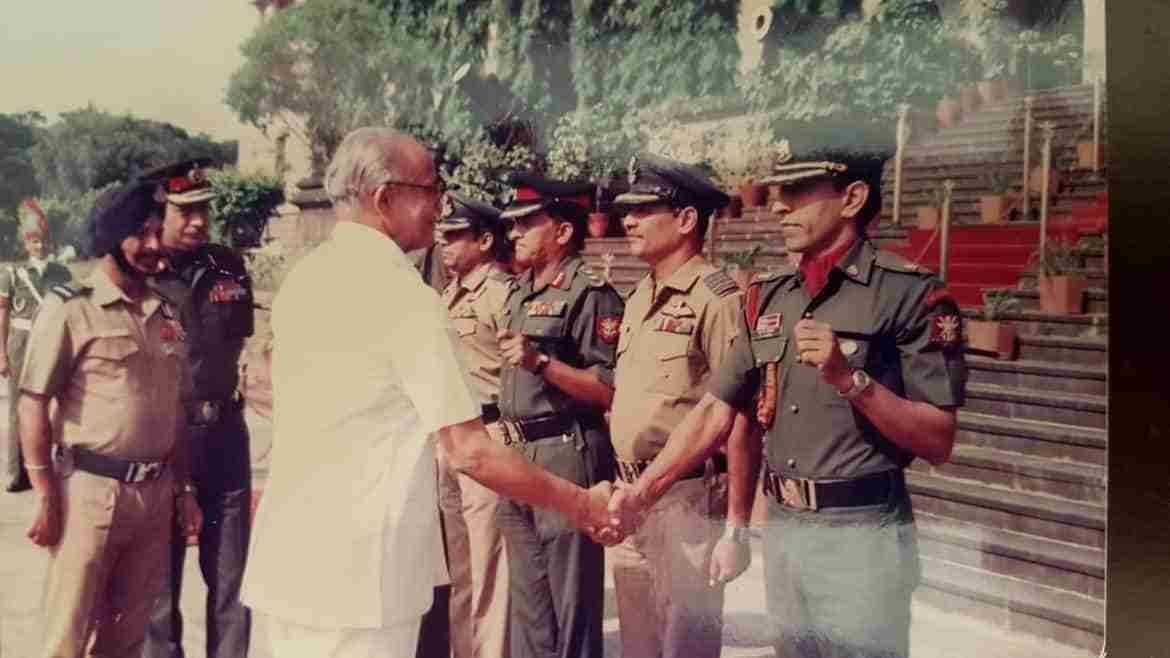The ‘Adjutant’ is an appellation used to designate a military rank responsible in assisting (Latin adiutare) the commander of troops in matters of discipline, routine administration and meting out necessary punishment. Sometimes used as a prefix as in Adjutant General or as a suffix, Subedar Adjutant, the word inspires awe, respect and fear amongst all ranks of any military organisation.
The stage
The Hindi equivalent is more apt to describe the designation: ‘दंडपाल’, ‘Dandapal’; the one who wields the ‘rod’. The rod is not meant literally but denotes the ‘danda’, ie, ‘force’; the ultimate tool of coercion in the four ‘upayas’ or methods of ‘Dharmashastra ‘, the ancient Indian didactic manualon duty & administration.
In the training academies of the Indian Army, the Adjutant normally a senior Major or a Lieutenant Colonel is literally ‘The Rod’. He is responsible for maintaining discipline amongst the cadets and wields tremendous authority to dispense justice.
Most importantly, he is responsible for the Passing Out Parade every term (six months), the definitive event for the graduating course normally presided over by the President or the Chiefs of Army /Navy / Air Force. The parade is the Adjutant’s show, his Capstone event, the precision and pomp associated with it is normally directly proportional to his personality.
It would be evident by now to the audience that the Adjutant in training academies is not for the faint hearted. Imagine being correct always and every time, 24 / 7, relentlessly being observed by the officers, drill sergeants (his executioners) and especially the cadets. Everyone wants this custodian of morality, discipline, steadfastness and the foremost upholder of the sanctity of the uniform to falter.
He cannot afford a misstep, he has to be the paragon of virtue, poise, dress and discipline both on and off parade. We as cadets were confident that the Adjutant would be speaking to his wife also in an officious, dry and cryptic tone and tenor. The Adjutant can never let his hair down.

Coupled with the aura surrounding the Adjutant, is the clay like impressionable audience he is addressing both through verbal and non-verbal communication. The 2000 odd cadets at the National Defence Academy are aged between 17 & 20 years. The foundation of their character is being moulded during these formative years of their nascent career. They need a Role Model, a lighthouse, a beacon to focus their efforts on; to idolize and to emulate.
It would be evident by now to the audience that the Adjutant in training academies is not for the faint hearted. Imagine being correct always and every time, 24 / 7, relentlessly being observed by the officers, drill sergeants (his executioners) and especially the cadets.
The Adjutant therefore becomes the ideal candidate. He is ever present, riding his charger (his horse is referred to as the charger in true cavalry tradition) during the Drill periods, ie, at least four times a week for the cadets. He is also seen taking reports from the Cadet Seniors during all central events which happen at least two or three times a month. All cadets know him and know of him as opposed to other officers who are seen by a select target audience in respective battalions and squadrons. That’s the stage for the play and now we introduce the Hero or Hamlet
Hamlet and the Adjutant
The hero of our play is the Adjutant; on that we have drawn a consensus but what matters is who plays Hamlet. The requirements of the character are so vast that ordinary actors will fail the part. It’s not as if one can method act for a couple of scenes. You have to stay in the role forever. Something like Marlon Brando as the Godfather. You stay in the character permanently, even when you stop playing the role. The Indian Army has therefore a tough challenge to get a suitable personality to fit the role.
The powers that be have however delivered and till date the list of Adjutants is exemplary many of whom played that character for life. However, once you have seen your Adjutant live, in person, idolized him, eulogized him then every other actor fails in comparison. It’s like telling my father that Heath Ledger played the Joker better than Jack Nicholson, he will never believe it.

I was a cadet myself but my impressions of the Adjutant were already cemented through my father’s eyes. The character that fit that mould as described to me was Major S K Gadeock(later Lt Gen) who was the Adjutant during my father’s time and I grew up hearing stories of him. I describe him second hand from my father’s narrative but I am a better story teller. Fair, handsome, six feet tall,of a lean and wiry frame and an aquiline nose, he looked like a character from Sergio Leone’s Westerns. Especially, since he was always on the horseback in the drill Square.
A Guardsman, his uniform with the Garuda on the Peak Cap and the golden cluster of buttons on the uniform with a gold and red aiguillette, a perfect crease on the shirt and olive-green breechesthey say was a sight to behold. The word sharp comes to mind, everything about him was incisive, his looks, his horse’s gait, his voice was as if it would cut through everything.
There was no loose end, or blunt edge or curves. Everything was straight lines and angles……….I think the reader gets the idea by now. As if this wasn’t enough, his accent………….a crisp, public school clipped rendition was another shocker. Amongst the chaste rustic and earthy language of the Drill Ustads (instructors) was this contrast, even the Hindi was anglicised.
In retrospect, I realize that a lot of senior leadership (most of it in fact) is theatre. Everyone wants his hero to be dramatic. He wouldn’t be a hero if he was dry, dour and sultry(unless he is Amitabh Bachchan). Major Gadeock was dramatic, his entry was always grand. Dressed in his best (always), he trotted into the Drill Square, ramrod straight on his grey charger tossing its head and flailing its tail. The horse,apparently enjoyed the performance as much as his rider and being a horse, when it was abreast one of the squads; would let out a huge fart and crap all over the place.
An unintended, earthy and rustic interruption in the grandiose design but the Adjutant would pretend nothing has happened, he would never let this minor hiccup spoil the show instead without blinking an eyelid he would look at the Drill Ustad and admonish him in English, “ Ustad this what my horse thinks of your squad’s drill” Now the Ustad did not understand a word of what he said but he got the tone and tenor and that was the end of all the snickering and wise cracks amongst the cadets who were then subjected to the most ghastly calisthenics possible on a drill square.
Obviously, Major Gadeockwould be smiling as he rode past but he would never let the cadets know. Never did the cadets see him abuse or raise his voice (his voice,I am told was sharp and loud as it is) or lose his temper. His presence was enough. It electrified the instructors and then they started barking and shouting orders at their charges and all hell broke loose for the cadets.
Major Gadeock, however was a coconut, behind the façade of a strict disciplinarian lurked a warm and soft core. He neverdished out punishments on parade unlike his assistant who would dish them out like candy. Even when cadets where marched up to him for minor offences or misdemeanours, he let them go lightly.
The cadet’s would dread his absence for it was the ‘undertaker’, the Assistant Adjutant who gladly took on the role of दंडपाल’, ‘Dandapal’ and would proceed to dispense justice injudiciously. Popular amongst the parents who came for the Passing Out Parade who saw him with his sword drawn riding on his grey charger behind the cadets; an imposing figure if ever there was one, the Adjutant would be flocked during the tea that followed the parade; by the cadets and their parents leaving many a dignitary envious and jealous.
Sometimes, the actor and the character merge so much that they get diffused. One doesn’t know TE Lawrence but Peter ‘O’ Toole is synonymous with Lawrence of Arabia as is Clint Eastwood with Dirty Harry. Any attempt by anyone else will fail miserably. General Gadeock for my father will always be the Adjutant, no one can replace that image.
It is a great tribute to the class of the man that he not only fulfilled the shoes of the character that he had to play but moulded that character into an epitome of correctness, poise, humour and warmth, a role model and a beacon for all to emulate. It was through this prism that I saw all my Adjutants, did they pass, well that is another story.


